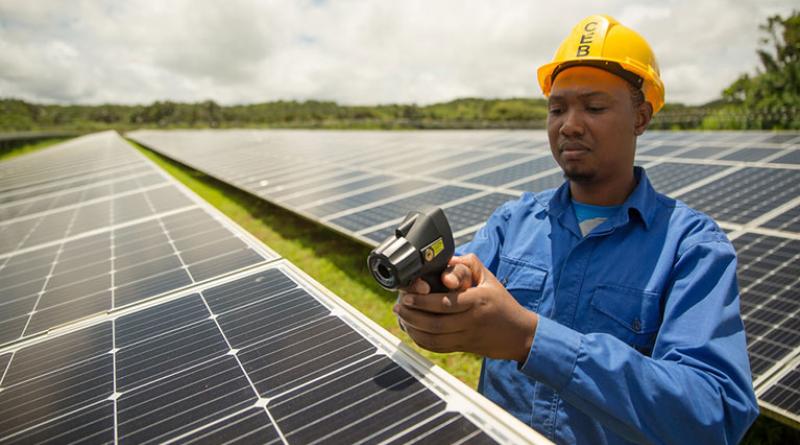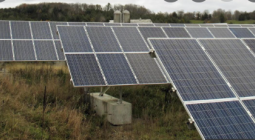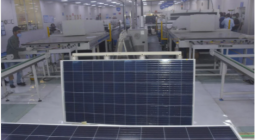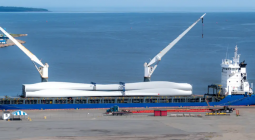Renewable energy jobs hit 12.7 million globally

New report confirms growth in renewable jobs despite multiple crises and calls for targeted industrial strategies to create stable supply chains and decent jobs.
GENEVA (ILO News) – Worldwide employment in renewable energy reached 12.7 million last year, a jump of 700,000 new jobs in one year, despite the lingering effects of COVID-19 and the growing energy crisis, according to a new report.
Renewable Energy and Jobs: Annual Review 2022 identifies domestic market size as a major factor influencing employment generation in renewables, along with labour and other costs. Solar energy was found to be the fastest-growing sector. In 2021 it provided 4.3 million jobs, more than a third of the current global workforce in renewable energy.
The new report was published by the International Renewable Energy Agency (IRENA) in collaboration with the International Labour Organization (ILO), during the Global Clean Energy Action Forum in Pittsburgh, USA.
With rising concerns about climate change, COVID-19 recovery and supply chain disruption, national interest is growing in localizing supply chains and creating jobs at home. The report describes how strong domestic markets are key to anchoring a drive toward clean energy industrialization. Developing renewable technology export capabilities is also dependent on this, it adds.
Francesco La Camera, IRENA’s Director-General, said; “In the face of numerous challenges, renewable energy jobs remain resilient, and have been proven to be a reliable job creation engine. My advice to governments around the world is to pursue industrial policies that encourage the expansion of decent renewables jobs at home. Spurring a domestic value chain will not only create business opportunities and new jobs for people and local communities. It also bolsters supply chain reliability and contributes to more energy security overall.”
The report shows that an increasing number of countries are creating jobs in renewables. Almost two-thirds of all these jobs are in Asia. China alone accounts for 42 per cent of the global total, followed by the EU and Brazil with ten per cent each, and the USA and India with seven per cent each.
ILO Director-General, Guy Ryder, said; “Beyond the numbers, there is a growing focus on the quality of jobs and the conditions of work in renewable energies, to ensure decent and productive employment. The increasing share of female employment suggests that dedicated policies and training can significantly enhance the participation of women in renewable energy occupations, inclusion and ultimately, achieve a just transition for all. I encourage governments, workers’ and employers’ organizations to remain firmly committed to a sustainable energy transition, which is indispensable for the future of work.”
The report highlights some notable regional and national developments. These include Southeast Asian countries becoming major solar photovoltaic (PV) manufacturing hubs and biofuel producers. China is the pre-eminent manufacturer and installer of solar PV panels and is creating a growing number of jobs in offshore wind. India added more than 10 Gigawatts of solar PV, generating many installation jobs, but remains heavily dependent on imported panels.
Europe now accounts for about 40 per cent of the world’s wind manufacturing output and is the most important exporter of wind power equipment; it is trying to reconstitute its solar PV manufacturing industry. Africa’s role is still limited, but the report points out that there are growing job opportunities in decentralized renewables, especially in support of local commerce, agriculture, and other economic activities.
In the Americas, Mexico is the leading supplier of wind turbine blades. Brazil remains the leading employer in biofuels but is also adding many jobs in wind and solar PV installations. The USA is beginning to build a domestic industrial base for the budding offshore wind sector.
The report highlights that the expansion of renewable energy needs to be supported with holistic policy packages, including training for workers to ensure jobs are decent, high quality, well paid and diverse in pursuit of a just transition.
About the International Renewable Energy Agency (IRENA)
IRENA is the lead intergovernmental agency for global energy transformation that supports countries in their transition to a sustainable energy future and serves as the principal platform for international cooperation, a centre of excellence, and a repository of policy, technology, resource and financial knowledge on renewables. With 168 Members (167 States and the European Union) and 16 additional countries in the accession process and actively engaged, IRENA promotes the widespread adoption and sustainable use of all forms of renewables in pursuit of sustainable development, energy access, energy security and low-carbon economic growth and prosperity.
About the International Labour Organization (ILO)
Established in 1919, the ILO is the only tripartite U.N. agency. It brings together governments, employers and workers of its 187 Member States, to set labour standards, develop policies and devise programmes promoting decent work for all women and men.
cover photo: © Stéphane Bellerose / UNDP




